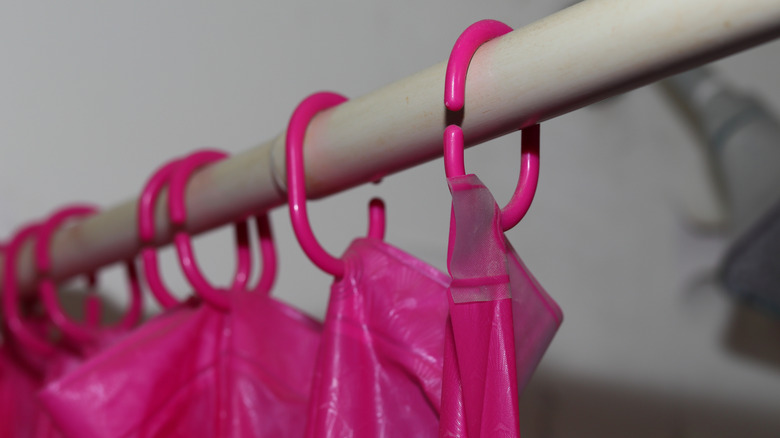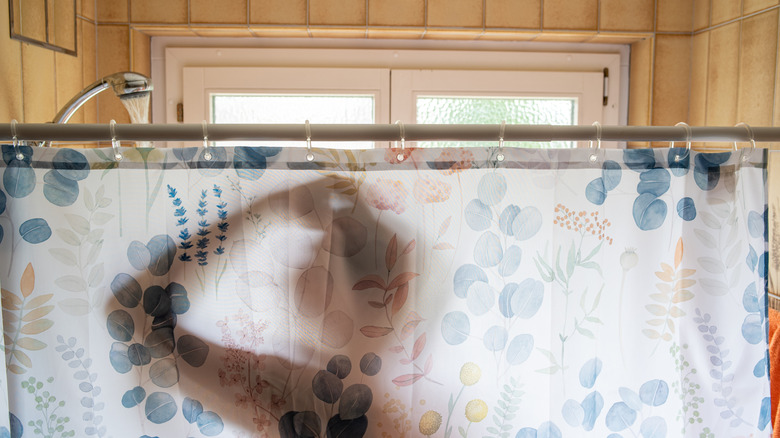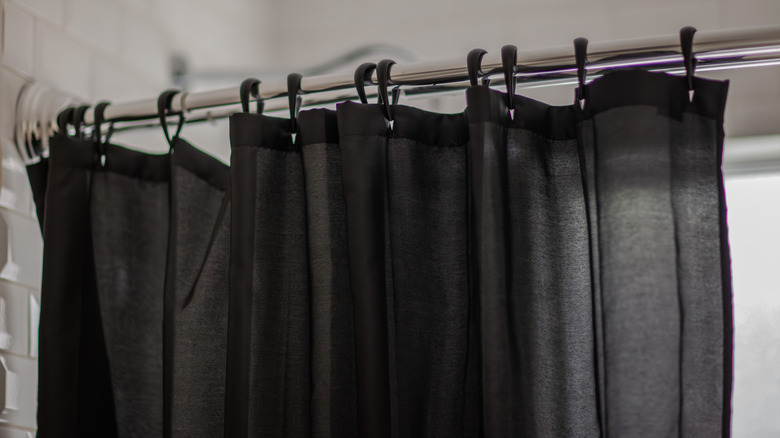The Toxic Problem With Plastic Shower Curtains That You Should Be Aware Of
When hunting for the perfect shower curtain, you probably zero in on the right color to match your tiles, or the ideal height to drape just right over your tub. That part is easy and fun. Here's the other part that most people don't think about: Those plastic shower curtains? They can be secretly quite toxic, so there's more to picking a curtain than just aesthetics.
The culprit is polyvinyl chloride, or PVC for short. You've likely heard of this type of vinyl plastic because it is commonly found in household items like PVC pipes, outdoor furniture, and even shades. It's so popular because it's heat-resistant, durable, and it's easy for manufacturers to use. So it's not surprising to find PVC lurking in your shower curtains, but despite its widespread use, it's actually quite hazardous — it contains harmful chemicals that can be released into the air and inhaled. In addition to that, another chemical compound called phthalates is added to PVC to make the plastic soft and flexible enough for shower curtains, an ingredient which is linked to several health issues.
Here's what you should know about plastic shower curtains, whether they are quietly releasing toxic chemicals into your bathroom air, and if you should be concerned.
The dangers of out-gassing and vinyl curtains, explained
Knowledge about the toxicity of shower curtains first went widespread following a 2008 study published in Epidemiology. To understand how your shower curtain (and your equally toxic blackout curtains, for that matter) might be poisoning you, let's rewind a bit. You might be wondering — how do the chemicals in a shower curtain end up in the air, let alone your body? The culprit is something called volatile organic compounds (VOCs). These sneaky chemicals can transform into gas and leach into the air, even when they start off as solids. In other words, they're polluting the air inside your home without you even realizing it. This process — known as out-gassing — is especially bad when it comes to PVC shower curtains. Why? Because heat and humidity only accelerate the process. So unless you're taking cold, dry showers... you're exposing yourself to these airborne chemicals every time you step into the shower.
Breathing in these gases isn't just unpleasant, it's dangerous. Short-term exposure to PVC fumes can mess with your nervous system, leaving you drowsy, or dealing with nasty headaches. Long-term? We're talking about potential liver damage and even an increased risk of liver cancer. And that's not all: Phthalates, the other nasty ingredient added to PVC, are known to mess with hormones and could be damaging to reproductive health. None of this is to say that people can't go every day using a plastic shower curtain without developing these conditions, but ask yourself — is it worth the risk?
The best non-PVC shower curtain alternatives
So yeah, any one of those potential conditions sounds great, right? Definitely not. At this point, you might be wondering whether your shower curtain is one of those silent killers and whether you will need to swap it out. To find out, start by checking the product info to see what it's made of. Can't find the label? No worries — there's another trick. Take a look at the recycling symbol on the liner. Inside that little triangle, you'll see a number. If it's a three, that means it's PVC (it also means it's not recyclable, which is just one more reason to ditch it for something safer next time).
If it's time to swap out your shower liner for something safer, don't stress — there are tons of great options out there. One option is to skip plastic altogether and go for a fabric shower curtain instead. Cotton, linen, or hemp shower curtains aren't just non-toxic, they're gorgeous. Think soft, airy, and chic, giving your bathroom that cozy, cottage-core aesthetic. Plus, they're machine washable!
If you'd prefer plastic, or if you want to still use a plastic liner with your fabric curtain, you'll need to keep an eye out for safe alternatives to PVC. The good news? There are tons of safe plastic alternatives. Look for PEVA (polyethylene vinyl acetate) or EVA (ethylene vinyl acetate) liners. They're waterproof, free from those nasty VOCs, and way better for your health. They're safe and super affordable, so you can keep your bathroom clean and dry without breathing in toxins.


